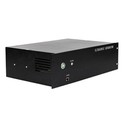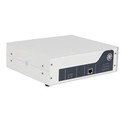Hey there, fellow aquarium enthusiasts! As a supplier of ultrasonic tank filters, I've been getting a ton of questions lately about how these nifty devices affect the water hardness in tanks. So, I thought I'd take a deep dive into this topic and share some insights with you.
First off, let's quickly go over what water hardness is. Water hardness refers to the amount of dissolved minerals, mainly calcium and magnesium, in the water. It's usually measured in parts per million (ppm) or grains per gallon (gpg). Hard water has a high concentration of these minerals, while soft water has a low concentration.
Now, you might be wondering how an ultrasonic tank filter comes into play here. Well, ultrasonic tank filters use high - frequency sound waves to create tiny bubbles in the water. These bubbles then implode, creating a phenomenon called cavitation. Cavitation helps to break down and remove various impurities in the water, including debris, dirt, and some types of dissolved substances.
One of the ways an ultrasonic tank filter can potentially affect water hardness is by removing some of the calcium and magnesium ions. When the cavitation bubbles implode, they generate a lot of energy. This energy can cause the calcium and magnesium ions to form larger particles or precipitates, which can then be filtered out of the water.
Let's look at a real - world example. Imagine you have a fish tank with hard water. Over time, the calcium and magnesium in the water can build up on the glass, decorations, and even on the gills of the fish. This can not only make your tank look dirty but also be harmful to the fish. When you install an Ultrasonic Tank Filter, the cavitation process starts working its magic. It helps to break up the mineral deposits and remove them from the water, gradually reducing the water hardness.
However, it's important to note that an ultrasonic tank filter is not a magic bullet for completely softening the water. It can only reduce the hardness to a certain extent. If you have extremely hard water, you might still need to use other water - softening methods in conjunction with the filter.
Another aspect to consider is the type of tank you have. For freshwater aquariums, a slight reduction in water hardness can be beneficial. Many freshwater fish species prefer slightly softer water. For example, tetras and guppies tend to do better in water with lower hardness levels. By using an ultrasonic tank filter, you can create a more suitable environment for these fish.
On the other hand, in saltwater aquariums, the situation is a bit different. Saltwater already contains a high amount of various minerals, and maintaining the right balance is crucial. An ultrasonic tank filter can help to keep the water clean and remove some of the unwanted impurities, but it needs to be used carefully so as not to disrupt the delicate mineral balance in the tank.
Now, let's talk about how an ultrasonic tank filter compares to other types of filters. There are mechanical filters, chemical filters, and biological filters. Mechanical filters mainly remove large particles like debris and uneaten food. Chemical filters use substances like activated carbon to remove dissolved chemicals. Biological filters rely on beneficial bacteria to break down organic waste.
An Ultrasonic Tank Filter has a unique advantage over these other filters when it comes to water hardness. While mechanical filters don't directly affect water hardness, and chemical filters are more focused on removing chemicals rather than minerals, an ultrasonic filter can target the calcium and magnesium ions specifically.
But like any product, an ultrasonic tank filter also has its limitations. The effectiveness of the filter in reducing water hardness can depend on several factors. The size of the tank is one important factor. A small tank might see a more significant reduction in water hardness compared to a large tank, as the cavitation effect can cover a larger proportion of the water volume in a small tank.
The frequency and power of the ultrasonic waves also play a role. Higher - frequency and more powerful ultrasonic waves can create stronger cavitation, which may lead to more effective removal of minerals. However, using too high a frequency or power can also be harmful to the fish and other tank inhabitants. So, it's all about finding the right balance.
If you're thinking about using an ultrasonic tank filter to manage water hardness, here are some tips. First, make sure to do regular water tests. You can buy water test kits from your local pet store or online. These kits will tell you the current water hardness level in your tank. Before installing the filter, take a baseline reading. Then, after a few weeks of using the filter, test the water again to see if there has been any change.
Second, follow the manufacturer's instructions carefully. Each ultrasonic tank filter is different, and the instructions will tell you how to set up and operate the filter correctly. This will ensure that you get the best results and avoid any potential problems.
In addition to its effect on water hardness, an ultrasonic tank filter has other benefits. It can also improve the overall water quality in the tank. By removing debris and impurities, it helps to reduce the growth of algae. Algae can not only make your tank look unsightly but also compete with the fish for oxygen.
Moreover, a cleaner tank means a healthier environment for your fish. Fish are more likely to be active, eat well, and have a better immune system in clean water. This can lead to fewer diseases and a longer lifespan for your fish.
If you're in the market for an ultrasonic tank filter, you might also be interested in our Ultrasonic Pipe Filter. This type of filter is great for larger water systems or for filtering water before it enters the tank. It uses the same ultrasonic technology to remove impurities and can be a great addition to your tank setup.
In conclusion, an ultrasonic tank filter can have a positive effect on the water hardness in your tank. It can help to reduce the concentration of calcium and magnesium ions, making the water softer and creating a better environment for your fish. However, it's not a standalone solution for water softening, and it's important to use it in combination with other appropriate methods.


If you're interested in learning more about our ultrasonic tank filters or have any questions about how they can work for your tank, feel free to reach out. We're always here to help you make the best choice for your aquarium. Whether you're a beginner or an experienced aquarist, we can provide you with the information and support you need. So, why not give our ultrasonic tank filters a try and see the difference they can make in your tank?
References
- Aquarium Water Chemistry Handbook
- Studies on Ultrasonic Filtration in Aquatic Environments





